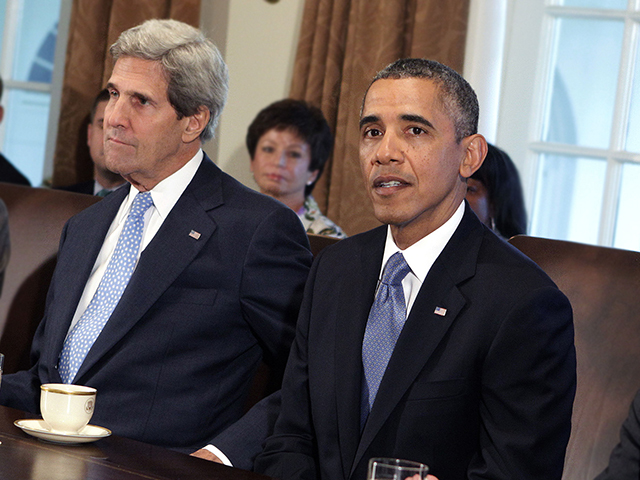In a now widely reported private meeting with U.S. lawmakers at a Munich security conference last weekend, Secretary of State John Kerry told them the administration’s policies toward the bloody Syrian civil war weren’t cutting it.
That’s a striking admission on the part of our chief diplomat.
I agree with Kerry that things are going horribly for our interests in Syria, but I do draw the line at the idea that Team Obama even has a real policy for a positive ending to the three-year conflict that has taken nearly 140,000 lives
>>> Check Out: Exclusive: Inhofe Demands Obama Answers on Benghazi
Despite President Obama’s happy talk in the State of the Union address about the removal of chemical weapons from Syria — a well-intentioned effort that seems to have stalled — the situation in the country is only getting worse.
First, after lots of chatter about a hopeful political solution to stop the conflict, the just-concluded Syrian peace talks between the regime and parts of the opposition that droned on for days in Geneva achieved nothing.
That’s right: zero, zilch, bupkis.
The talks couldn’t even get the Bashar Assad regime to allow humanitarian aid to millions at risk, in need or displaced by the conflict.
A U.N. official reportedly said recently that the Syrian refugee flows are causing the worst humanitarian crisis since the outflows surrounding the 1994 Rwanda genocide. A startling — and troubling — comparison.
Equally alarming is the continued rise of al-Qaeda and other militant Islamists in Syria. Some estimates put the number of violent jihadists at more than 25,000, including some 7,000 fighters who have flocked there from as many as 50 countries.
In recent congressional testimony, Director of National Intelligence James Clapper reported that Syria is a “huge magnet” for extremists and is used by al-Qaeda affiliates to “recruit, train and equip” other terrorist wannabes.
Clapper & Co. noted that some terrorists in Syria aspire to “conduct external attacks.” That means undertake terror strikes beyond Syria, including against the West and our homeland. There are training camps in Syria for this purpose.
You might say that Syria is becoming pre-9/11 Afghanistan.
The war’s effects aren’t contained to Syria, either. Surrounding countries such as Jordan have absorbed millions of refugees, putting a significant social and economic strain on the U.S.-friendly country.
Lebanon, due to Hezbollah’s fighting on the side of the Assad regime, has been rocked with violence. The high levels of terror attacks in Iraq are in part related to al-Qaeda’s resurgence in Syria.
If the Syrian regime holds on — and it may very well — the other big winner will be Iran, its closest ally in the Middle East. Of course, if the regime falls, the security vacuum could be filled by al-Qaeda and other assorted militant extremists.
The future for American interests in Syria doesn’t look bright — to say the least.
I’m sure the administration would insist that they have some sort of Syria policy. But the question is: When are they going to realize that “muddling through” and “hoping for the best” isn’t really a policy for protecting and advancing U.S. interests?
Peter Brookes is a Heritage Foundation senior fellow and a former deputy assistant secretary of defense. Follow him on Twitter: @Brookes_Peter.
